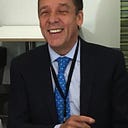Universal Declaration of Human Rights: Still Young After All These Years
On its 70th Anniversary, the Universal Declaration of Human Rights needs a strong civil society to fulfill its promise
It’s hard to imagine what the delegates of the 58 members of the United Nations would have felt if, as they adopted the Universal Declaration of Human Rights in Paris on a Friday night 70 years ago today, they had caught a glimpse of the world in 2018. But it is safe to assume that all of them — especially the few who abstained or didn’t vote — would have been greatly surprised.
The delegates would be amazed to discover that, 70 years on, the Declaration has lost none of its significance: The painstakingly negotiated document remains the highest collective expression of human conscience ever produced. True, the Declaration is not always the remedy to abuse — but those 30 concise articles, some of them less than 30 words long, still represent the core principles and obligations that shape international relations, written in plain language that withstands the test of time.
Yet in 1948 the world did not have 250 million people living outside their country of birth, nor did it need the Global Compact to address human rights violations against them that the UN is discussing today in Marrakesh. And if these seven decades have brought striking progress, they have not erased the distance between aspiration and reality.
Take women’s rights, arguably the most strenuously negotiated part of the Declaration: What would have impressed Eleanor Roosevelt or Hansa Mehta, had they seen today’s world? Surely that the condition of women has made extraordinary progress since 1948, but also that discrimination and inequality are still a shocking daily reality for millions of women. To paraphrase George Orwell: all humans are equal, but one half of humanity is more equal than the other.
Consider education. Higher education is not the privilege of a tiny minority anymore, and the gains in global school enrollment have been massive. But we cannot be satisfied knowing that in low income countries, for example, four young girls out of ten do not finish primary school.
The first words of the Declaration state that All human beings are born free, but there is no freedom in ignorance. Education is a multiplier: If a society delivers on the right to “an education directed to the full development of the human personality and to the strengthening of respect for human rights and fundamental freedoms”, as the Declaration states, then it will also fulfill its commitment to the right to freedom of opinion and expression.
A good education, as the delegates in Paris perhaps did not fully realize, is not just a seat in a classroom. We know now that the promise of the Declaration will be realized only with a stronger focus on learning rather than schooling, a determined effort against inequality, a better use of technology tools that were unthinkable just a few years ago. And only if we bridge the staggering gap between education needs and investment: If you think education is expensive try ignorance, as the saying goes — yet with all the evidence we have today on the far-reaching benefits of delivering on the right to education, we still seem quite comfortable with ignorance.
But the daunting task ahead should not hide the achievements. After the devastation of two world wars and the tragedy of the Holocaust, the Declaration was a source of hope in the capacity of humankind to create a better world, and an injunction to deepen global cooperation towards a common standard of achievement for all peoples and all nations. We can maintain that hope and improve global education outcomes — but only with a robust civil society. The delegates from 1948 would not be just surprised: They would also be deeply impressed, I am sure, to see how their vision and sense of collective responsibility have been upheld to our day by individual citizens and civil society organisations.
Across the world, local leaders and social movements, big and small, show their determination to forfeit everything — including sometimes their lives — in defense of human rights. UN Resolution 217 adopting the Declaration was a powerful change agent — but so was Nelson Mandela’s resolution to promote education as an instrument of development, social justice, inter-racial equality and human rights; and so was Malala Yousafzai’s courage to stand up and remind the world that girls also have the right to go to school.
Policy makers and civil society organisations are different animals that often speak different languages, but they depend on each other to achieve their vision more than they think. While governments and international institutions have many powers at their disposal, the capacity to mobilize and inspire citizens belongs to civil society organisations.
This is what has driven me to join Teach For All after serving in an international institution for three decades. Across the world there is a generation of talented young leaders of all origins and backgrounds who believe in human rights and in the transformational power of education; Teach For All and its growing network of country organisations — 48 today, many more tomorrow — give these generous young women and men the means to be agents of change to ensure that even the most marginalized children of their own country are able to fulfill their potential. I cannot think of a more uplifting, stimulating task than to contribute however modestly to this mission.
If the Universal Declaration of Human Rights didn’t exist, we would have to invent it; then we would still need individuals and civil society organisations like Teach For All to mobilize communities, engage with government institutions, and fulfill that 70-year old promise.
*Xavier Prats-Monné joined Teach For All as Special Advisor in October this year. He previously led the Departments of Education and Culture and Health and Food Safety of the European Commission, the executive branch of the European Union.

